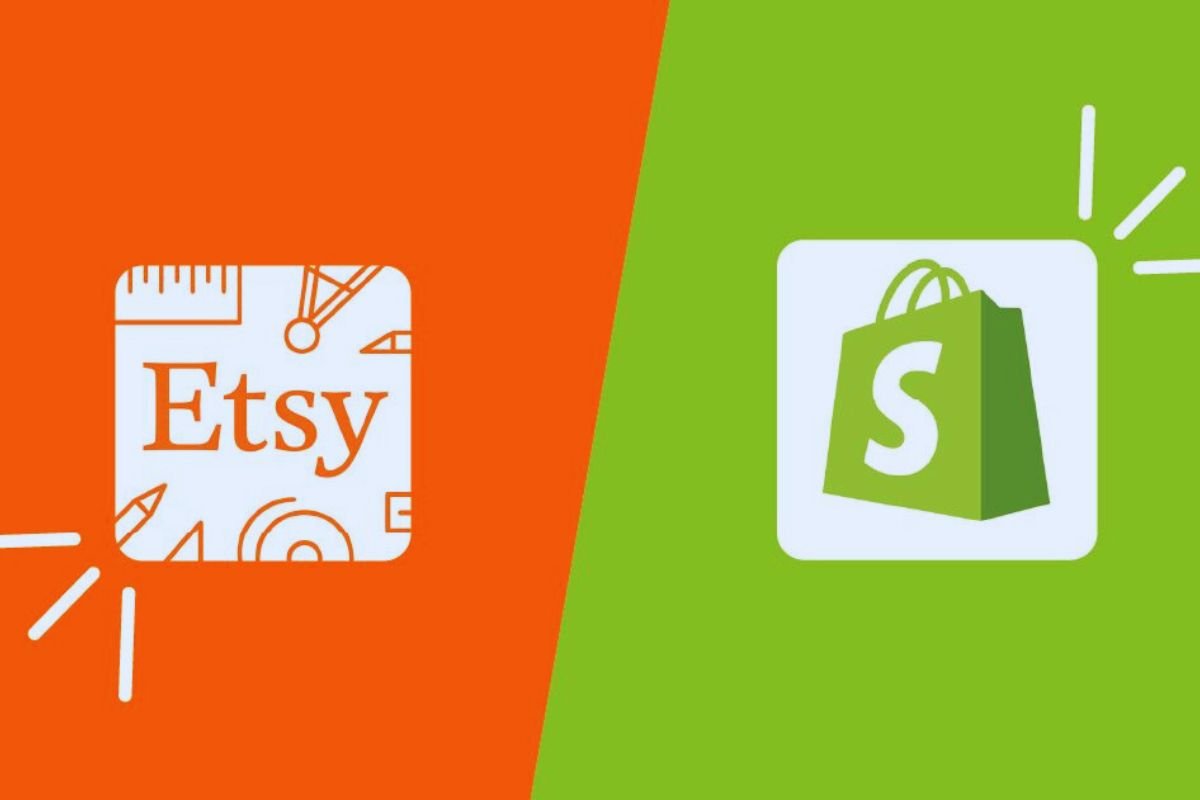When evaluating etsy vs shopify, it’s crucial to match platform strengths to your goals. In the opening paragraphs, let’s focus on how etsy vs shopify differs in traffic, fees, and business trajectory.
Choosing between etsy vs shopify isn’t just about features—it’s about strategy: whether you start fast, or build long-term brand control.
1. Platform Fundamentals: Marketplace vs Independent Store
The core difference in the etsy vs shopify debate begins with structure.
Etsy is a curated marketplace: your products exist alongside many others within a shared ecosystem.
Shopify provides a standalone platform: your own domain, design, and backend—offering total control and flexibility Skai LamaZapier.
2. Customization & Brand Identity
In etsy vs shopify, Shopify clearly leads branding opportunities.
You can customize Shopify themes, layout, checkout flows, and marketing messaging.
Etsy offers only limited personalization—banners, descriptions, and shop icons—while maintaining Etsy branding across customer experience FoxEcomSkai Lama.
3. Audience Access & Discoverability
In the etsy vs shopify comparison, Etsy’s biggest advantage is its built-in audience.
Etsy surfaces your items to buyers already searching for handmade or vintage goods.
With Shopify, you need to attract visitors through SEO, ads, and marketing—though you fully own customer data Skai Lama+1Sumtracker+1Wikipedia.
4. Cost Structures: Fees, Subscriptions, Margins
When thinking about etsy vs shopify, pricing defines long-term profitability.
- Etsy: charges $0.20/listing, plus 6.5% transaction fees and mandatory offsite ads fees over $10K/year reddit.com+13pagefly.io+13Skai Lama+13Wikipedia+1pagefly.io+1.
- Shopify: charges a monthly subscription plus payment processing fees, lower when using Shopify Payments, and no listing charges shopify.com.
At small scale Etsy may be cheaper—but Shopify offers better margins as sales grow.
5. Growth Potential & Scaling Comparisons
For etsy vs shopify, scalability favors Shopify.
Shopify supports hundreds or thousands of SKUs, international markets, POS, wholesale, and Shopify Plus tiers for enterprise.
Etsy caps expansion via limited customer data access, algorithm dependence, and fewer automation tools glamour.com+7FoxEcom+7Wikipedia+7.
6. Marketing & Tool Ecosystem Comparison
In etsy vs shopify, the marketing infrastructure is a major differentiator.
Shopify includes built‑in email marketing, analytics, abandoned cart automation, blog tools, and access to 8,000+ apps for everything from upsells to accounting FoxEcomSkai Lama.
Etsy focuses on promoted listings and shop visibility, but lacks deep automation or integrations.
7. Seller Support & Platform Reliability
Evaluating etsy vs shopify, Shopify shines in support.
It offers 24/7 live chat, email, phone, a vast help center, and community forums.
Etsy provides faster onboarding but relies on slower email support and policy enforcement can sometimes feel opaque to sellers websitebuilderexpert.comcharleagency.com.
8. Product Restrictions & Eligibility
In etsy vs shopify, what you can sell matters.
Etsy restricts sales to handmade, vintage, or craft supplies—restricting dropshipping or manufactured products without creative involvement Sumtracker+2Wikipedia+2FoxEcom+2.
Shopify allows nearly any legally permissible inventory and niche—ideal for broader or unconventional product types.
9. Risk Management in Using Both Platforms
A wise etsy vs shopify strategy often involves hybrid use.
Many sellers start on Etsy for exposure, then transition to Shopify to build direct relationships and brand ownership.
Tools now sync inventory, orders, and customer data for seamless crossover Sumtracker.
10. Profit Simulations: Real-World Fee Impacts
In comparing etsy vs shopify, real seller data shows difference.
One ecommerce analysis found Etsy fees consumed twice as much profit as Shopify fees for a $1,000+ sales stream—Etsy took $378 vs Shopify $171 in fees bootstrappingecommerce.com.
As volume increases, Shopify’s fixed fee + payment processing model wins.
11. SEO & Traffic Ownership Benefits
Considering etsy vs shopify, Shopify gives you SEO advantage via literature—a branded URL, metadata control, and content marketing.
On Etsy, search visibility depends on Etsy’s algorithm and internal promotion, limiting your visibility outside Etsy’s domain.
Driving traffic via your own blog or Google benefits Shopify’s open web structure.
12. Community Insights: Reddit Seller Experiences
User discussions support the etsy vs shopify narrative:
“Shopify helps build your own branded store… whereas marketplaces have their own customers.”
“Etsy brings traffic but you get buried fast. Shopify’s slower, but once you have an audience, it converts way better.” FoxEcomreddit.com+1Sumtracker+1
These insights reinforce market positioning: Etsy speeds early sales, Shopify rewards ownership.
13. AI and Automation Growth Use Cases
AI tools like Jasper, ChatGPT, or “vibe coding” help sellers customize Shopify stores without heavy development investment.
One user doubled their revenue by using AI and coding skills to enhance site branding and feature sets—something Etsy sellers can’t replicate due to platform limits businessinsider.com.
14. Choosing Based on Business Objectives
If evaluating etsy vs shopify, ask:
- Is immediate traffic and ease your priority (Etsy)?
- Do you aim to grow into a brand with flexibility, data access, and long-term control (Shopify)?
Your future scale potential defines the better platform.
15. Final Thoughts: Etsy vs Shopify Decision Guide
Choosing between etsy vs shopify depends on vision:
- Etsy is ideal if you’re testing creative product ideas with minimal setup.
- Shopify is best if you want full brand presence, higher scalability, and long-term profit potential.
Many sellers find success using Etsy first, then migrating or branching into Shopify.
Conclusion: Align Platform With Your Goals
The etsy vs shopify comparison boils down to trade-offs across access, control, scalability, and cost.
Etsy delivers instant marketplace traffic at a lower entry barrier but limits your independence and long‑term control.
Shopify demands more initial effort but rewards with brand ownership, richer tools, greater margins, and sustainable growth.
Decide based on whether you’re launching a creative side hustle or building a brand designed to scale — and choose the platform that aligns with your ambition.
